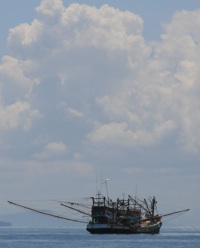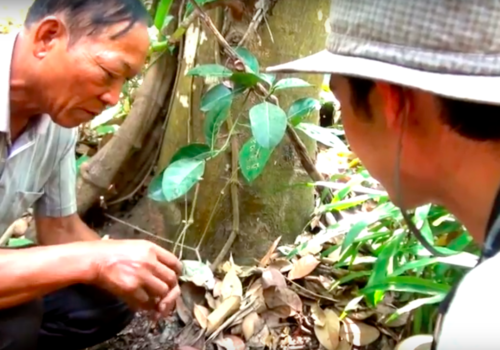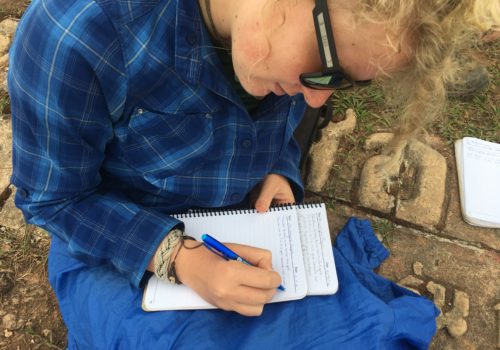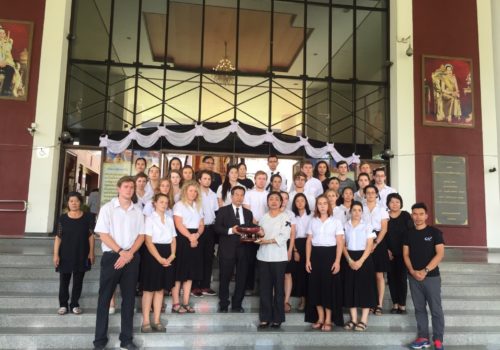
In Thailand, as in much of the world, more time is required to catch fewer and fewer fish.
Alanna Mitchell’s book, Sea Sick: The Global Ocean in Crisis, lays out in clear language the multiple challenges that are facing the oceans, from oxygen depleted dead zones, to the acidification of the oceans, to the crashing of the global fish stocks. Part travel writing, part investigative reporting, Sea Sick follows Mitchell around the world talking with scientists and seeing the crisis of the oceans first-hand.
We’ve been looking for a good book that we can use on our Coastal course as well as the Islands course. Mitchell’s book is perfect for what we needed — a book with the big picture, and lots of links into the primary literature. So, for example, while reading about her visit to Halifax and discussions with scientists studying the crisis of global fisheries, we also read the journal articles that those scientists have written (such as Worm, Boris, et. al., “Impacts of Biodiversity Loss on Ocean Ecosystem Services,” Science, Vol. 314, November 2006).
Here are some excerpts (from the book’s page online).
The ocean is built to withstand change. It has layers of safeguards that the atmosphere and the land systems do not, and yet even these are being breached. It is a larger and more serious problem than atmospheric change.
However, we are not hearing much about it, or about the implications for life on the planet–not just human life and civilisation, but life in general. We hear from time to time about overfishing, or about the cities that would flood if the sea level rose, or about coral bleaching, but rarely everything put together…
About 250 million years ago, during the time known as the Great Dying at the end of the Permian period–the biggest mass extinction the world has yet known–the ocean’s oxygen ran out. There are a couple of theories about why this happened, but a leading candidate is that the surface layer warmed up enough and became salty enough to disturb the currents. Currents feed oxygen from the atmosphere into the ocean and move nutrients around. When the oxygen vanished, most life on land and in the sea–more than 90 per cent of the species then alive–died.
The point of the story, [Flannery] said, is that it is clear that the ocean contains the switch of life. Not land, nor the atmosphere. The ocean. And that switch can be flipped off.
We know it’s happened in the past, he told me. We just don’t know the trigger.
As the book makes clear, we may have pulled the trigger without realizing it.
A few good points from the book:
- The ocean produces half the oxygen we breath. In other words, every other breath comes from the ocean.
- 99 percent of the living space on the planet is the ocean.
- Most of us have a “terrestrial bias” and really mostly think about only the very surface of the ocean (when we think about it at all).
- If all terrestrial life ceased, the life in the oceans would go on. If life in the oceans ceased, terrestrial life would also cease.
The book provided the basis for some great discussions. One of the main things that kept coming up over and over again was the question of WHY. Why do students grow up in school studying the destruction of the rainforest, and for most of the students, this was the first time they had read about the crisis facing the oceans? Their own experience proved Mitchell’s point of terrestrial bias.
Today, the students are down in Trang, Southern Thailand, camping on the beach and sea kayaking through the mangroves. The next few days will be spent padding and diving, learning about mangroves, sea grasses and reefs. Tomorrow requires a crossing to Koh Muk, and paying attention to wind, tides and currents will be key. In just over a week, they will paddle down the coast to a small Muslim fishing village, and spend the remainder of the course learning from their host families about the crisis of the oceans Mitchell writes about, and what one small Thai community is doing to help conserve the mangrove and sea grasses, and make a difference in the future of the oceans.
This is a great book. Get it, read it, and pass it on to someone else to read.



